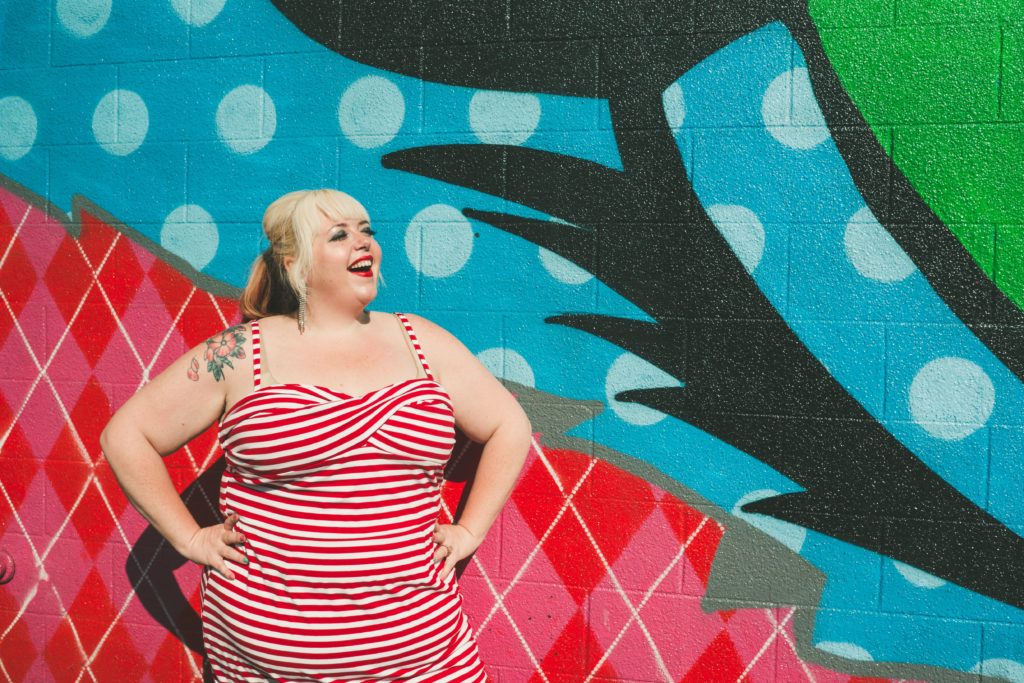
This is Bevin! As seen by Lindley Ashline.
To listen to this episode, click the sassy redhead on a peach background, and become a patron of the horizontal arts…
Bevin: I think part of the grief in those breakups was: I can’t have this person in my life anymore. And sometimes, I think people, when we experience heartbreak, we’re just experiencing people breaking our expectations of what they’re supposed to be in our lives. When in fact, if we get out of the way, people can really bloom for us in ways we don’t expect.
Lila: Did you have a period of no contact?
Bevin: Yes. Always. It’s my first, advice to anyone going through a breakup is 30 days no-contact at least. Sometimes a couple years can change everything.
***
Bevin: And managing your emotional attachment, which is a skill that you can develop.
Lila: (sighs sonorously) Have you developed that skill?
Bevin: Yes. It’s not— perfect. I still find myself sliding towards people who— I learned the same lesson of: Focus on the one who is focused on you, when I was first dating my current partner, and, I was dating her and dating this person who I just genuinely believed was like, the Future Mrs. Branlandingham, like I just was like—
Lila: Mph!
Bevin: You’re, you’re it, you’re it. And then, that person wasn’t. Like went away for business and just, stopped paying attention to me. (Lila hmmmms) And then, there was Dara — my current partner — who was like, paying attention to me, focusing on me and then I was like, Okay!
Lila: (chuckles) Okay!
Bevin: I get that! We’ll do that. And then Dara and I have had a — we like to call it a meet messy, like we had a first iteration—
Lila: Meet messy! As opposed to a meet cute.
meet messy (noun) = Bevin’s phrase, a playful spin on the term meet cute, which refers to the first time the two protagonists of a romantic comedy meet. In a meet messy, as opposed to a meet cute, things are far from adorably, quirkily perfect.
meet cute (noun) = the first time the two protagonists of a romantic comedy meet in some adorable, quirkily perfect scenario.
Bevin: Yes exactly. So, like, that was our first meet messy, and then like, I focused on her, and then, we broke up and then, we got back together. And then have now been in this iteration / partnership for like 5 years. So.
Lila: And how have you managed your emotional attachment?
Bevin: So, I can freely emotionally attach to her, ‘cause she’s now freely available for me. But, we have an open relationship, so there’s a couple people who like, cycle in and out of my life, who like are both, available and then not available, and I’m like really learning how to— be vocal about my desire, but then not get attached to the outcome of that person meeting that desire.
Lila: HOW DO YOU DO THAT?
Bevin: It’s fuckin’ practice, and self-esteem work, and like, detaching from outcomes, and, really being present and joyful and grateful for what is, instead of what might be, and what we think should happen, because it’s a “Hallmark romance.” (Lila siiiighs) And also trusting that like, our lives are long, and, I like to say, “I’m gonna be gay for a really long time, so if I don’t hit it with this person now, there’s always later, and like, maybe later I’m not attracted to them anymore, but maybe I am.
My patrons! Helloooo!
Though I’ve not yet freed myself from the holiday blues, I am feeling so grateful for you all. Sometime in soon-January (if you gave me your snailmail address through Patreon), you’ll be getting a handwritten thank you love note and a horizontal sticker to kick off 2019.

This is the lovely Bevin. Photo by Lindley Ashline.
In this episode, I lie down with Bevin: queerfatfemme, fearless torchbearer of body-positivity, warrior for self-love, aerobics instructor, and purveyor of radically colorful fabulosity. For more Bevin – her mailing list of weekly self-care motivation, her daily self-love videos, her reiki and Life Purpose Coaching sessions, find her on Instagram at queerfatfemme, or go to queerfatfemme.com
This episode, the second part of my expansive conversation with Bevin, is particularly dear to me, because in it, I tell the entire story of my recent abortion, a tale that begins 17 years ago, when I was a teenaged college student at New York University.
We also discuss Bevin’s first girlfriend, the 30 days no contact rule, demisexuality, sex-positive households, anticipation of needs as a love skill, feed-forward, sex party virginity, Boundaries / Fears / Intentions / Desires, focusing on the people who are focused on you, managing your emotional attachment, HSP’s, DTR’s, doulas of all kinds, meeting-messy, and being benefits, but not friends.
I’m so grateful for this episode with Bevin — her genuine self-love and self-compassion is infectious, and she provides some thoughts on my abortion story that shifted my perspective and inspired me to take action. Even though, as the Magic 8 ball would say, The Outcome is Still Unclear, I’m so glad I reached out.
In next week’s episode, I lie down with my college friend, the actor-romantic, Triple Threat, improviser, mimic, voice-over artist, chameleon, ham, and all-around delightful human, Burl Moseley. (If you want a sneak preview of how incredible he is, he recently got his own song on Crazy Ex-Girlfriend. It’s called: “Don’t be a Lawyer.” He sings, acts, and dances the bejeesus out of it, in full-on 90s wear. I have watched it an embarrassing number of times.)
We love it.
My dear patrons, come lie down with us (and a squashy-faced Persian cat named Biscuit Reynolds), in Los Angeles, California.
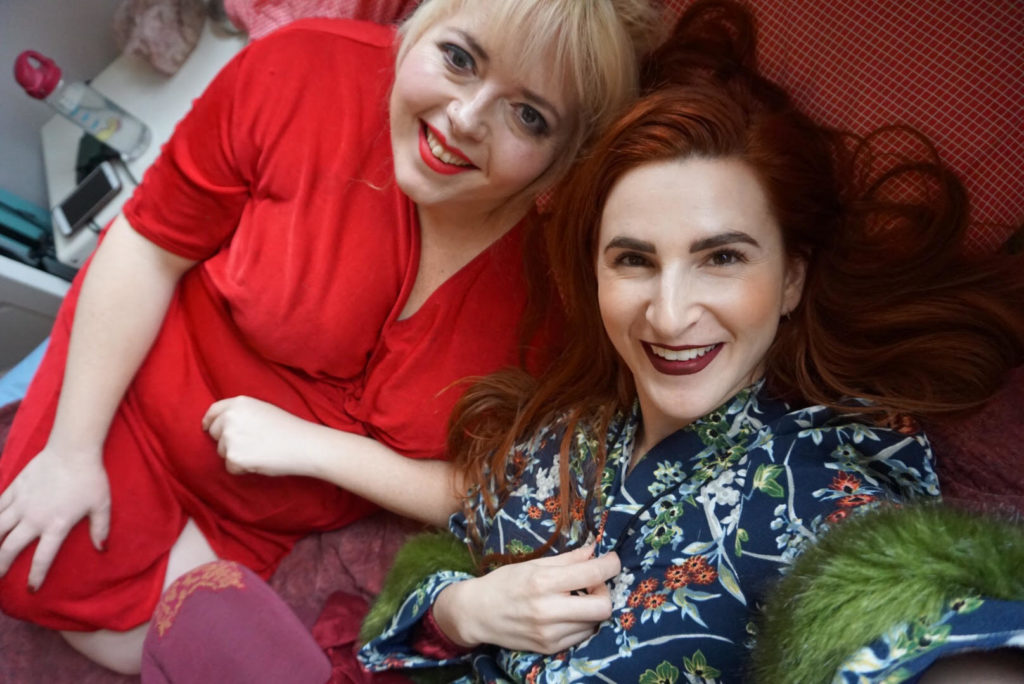
horizontal with Bevin in Los Angeles, California. December 2018
Links to Things:
This episode is currently available to patrons of $5 a month and up. Sign up, and I shall happydance!
The website for all things Bevin: queerfatfemme.com
Fat Kid Dance Party, Bevin’s dance aerobics project!
Bevin’s marvelous Instagram
The Insta of Bevin’s famous cat, Biscuit Reynolds
Sex Party Etiquette is Useful for Every Kind of Sex, an article by horizontal guest (episodes 2. stuff came out, and 18. sex on the subway tonight) Grant Stoddard, which includes a shortened version of the Boundaries / Fears / Intentions / Desires exercise that Lila does with play party dates.
Planned Parenthood, a web of clinics in the United States that provide free / low cost birth control, abortion access, STI tests, and reproductive care. Utilized by many underserved populations, and legions of people without health insurance. This is where Lila had her abortion.
Lila consulted with Pamela Samuelson, sexological bodyworker, bodycare witch, sex educator, the night before her abortion. Pamela’s episodes (which were recorded in L.A. one year prior, in Nov. 2017) are: 50. your pussy is not a sheath, and 51. take back the speculum.
“I’m an Abortion Doula: Here’s What I Do and See During a Typical Shift” an article about what it’s like in the volunteer position of abortion doula.
The Doula Project, which provides support to pregnant people regardless of the outcome of the pregnancy, free of charge
Kindara: The Fertility Awareness App, the app that Pamela Samuelson recommends (she of episodes 50. your pussy is not a sheath, and 51. take back the speculum!) for one of the most effective birth control methods in existence
Women’s Bodies, Women’s Wisdom: Creating Physical and Emotional Health and Healing, a seminal book that Bevin references when speaking of how women used to pass down wisdom about pregnancy
Poppy Liu, the creator of Names of Women and #shoutyourabortion, a creative director of Collective Sex, and star of Mercy Mistress, a series based on the life of YinQ, about a queer Chinese-American Dominatrix (which has just been picked up to be executive produced by Margaret Cho, and premieres this week!). Lila screened Mercy Mistress as part of her first Femme Domme BDSM Kink Taster event.
Poppy’s abortion story, in a ‘zine.
Show Notes (feel free to share quotes/resources on social media, and please link to this website or my Patreon!):
website link: https://horizontalwithlila.com/
Patreon link: https://www.patreon.com/horizontalwithlila
[3:16] Bevin on soulmates.
[4:30] Bevin on breakups.
[5:03] Lila tells Bevin the entire story of her recent abortion, a tale that began 17 years ago, when she was a teenaged college student at New York University.
[15:18] Bevin schools Lila a bit on body-positive language.
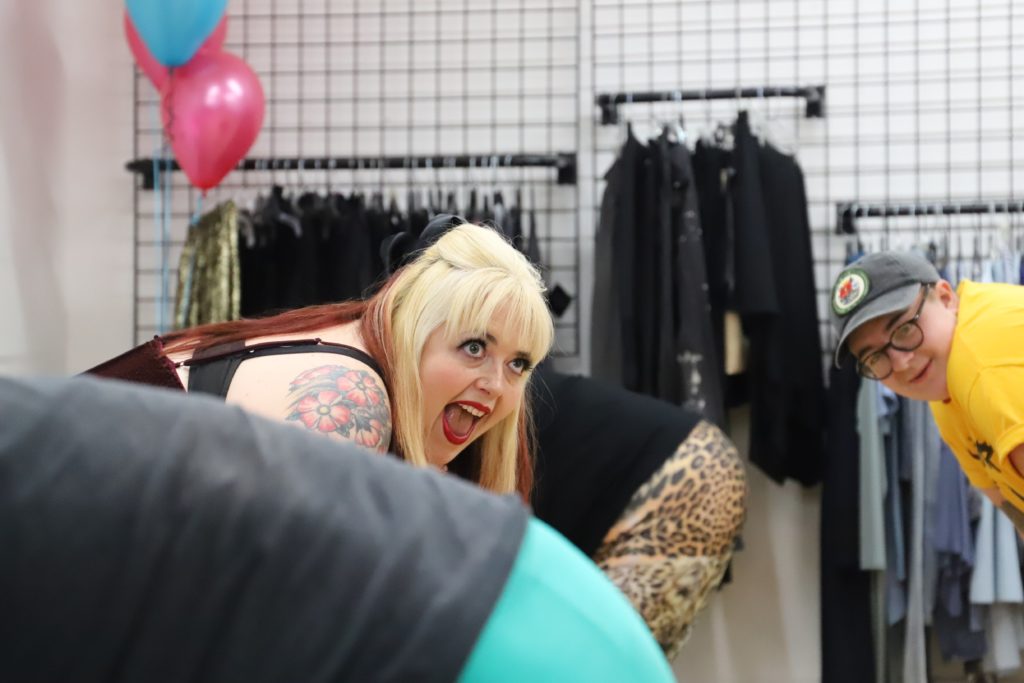
Bevin teaching Fat Kid Dance Party aerobics!
Lila: So we got undressed, and I was like “Whoa! You have been working out! You have taken really good care of yourself!” He has, you know, like an 8-pack and, just a beautiful cock and just, beautiful body.
Bevin: I just wanna interrupt real quick.
Lila: Yeah.
Bevin: From a body-positive perspective.
Lila: Yes.
Bevin: You can work out, and your body can totally not reflect it.
Lila: For sure.
Bevin: And that not every masculine body is — or feminine body — is capable of having an 8-pack. […] I just want people at home to know like, an 8-pack is not viable for like, probably 75% of bodies.
Lila: I don’t think I can have one.
Bevin: I know, it’s just weird that this is like some arbitrary idea—
Lila: (overlapping) Of working out.
Bevin: (underlapping) — that’s what a masculine body is supposed to look like.
[16:56]
Lila: It’s all new to him. He doesn’t have a sex-positive community, he doesn’t have that kind of understanding, or perspective — obviously, he’s coming from a, an extremely heteronormative background, and upbringing, and so I started explaining to him about the house and about the play parties that we throw, and how my preference is to really have a date for a play party. I don’t like to go and have pick-up play; it’s not my thing.
pick-up play (noun) = a sexual encounter at a sex party, aka a play party, that often involves a stranger, is not premeditated, and typically does not involve any already established partners.
Bevin: Pick-up play is so hard, and so stressful.
Lila: It’s just not my thing, I don’t, I don’t want it. I really want— because I’m a little bit— (Lila chuckles) Lindsey Doe called me a grey demisexual.
grey demisexual (noun) = a person who is somewhat, or the quality of being somewhat sexually attracted to people only after some amount of familiarity and emotional intimacy has been established. The word grey here is borrowed from the term grey asexual and is used to mean that the person has demisexual tendencies, but, for instance, may also have the capacity to become aroused by strangers as well, under certain circumstances. [Lindsey Doe used the composite term to refer to Lila.]
asexual or ace (noun) = a person who self-identifies as being without sexual attraction to or desire for others and little to no interest in engaging in sexual acts.
grey asexual or Gray-A or grace or gray ace (noun) = a person who self-identifies as somewhere between experiencing no sexual attraction / desire to experiencing sexual attraction / desire sometimes.
Lila: I’m a little bit demisexual. (Lila laughs)
Bevin: Same! Hard same! I can know if I feel emotionally safe with someone pretty quickly.
Lila: Yes, yes!
Bevin: But that’s the chemistry I’m always looking for.
Lila: Absolutely. So it’s not about time or familiarity, but it is about feeling—
Bevin: Love that, a grey demisexual.
Lila: — connection and comfort.
[18:10] Bevin asks Lila, “If you’re just going down to get cereal in the morning, is it possible that someone might just be fucking in your kitchen?”
[21:05] Lila on when she and Peter made love for the first time (continuing the abortion story).
[25:41] Bevin on a very good love skill.
Bevin: It’s good chivalry to just pay attention to what people need, and anticipate their needs—
Lila: Anticipation of needs, yeah, it’s just such a, a glorious gesture.
Bevin: And it’s not just for lovers— it’s for friends, it’s for, hosting in your home, it’s all the things, where you can anticipate someone’s needs — not to the sacrifice of yourself but, just to show that you care. I think we lose a lot of that in these modern times.
Lila: Without a doubt.
[26:10] Lila on the reading that she produced for Peter (abortion story continues).
[27:00] Bevin on feedback.
Bevin: It is really hard! I like to call it feed-forward. ‘Cause really, if someone is bothering to give you feedback in the first place, that is a trust that they’re doing that you can receive it. Because a lot of times, I don’t even bother to give people feedback because I don’t trust them to receive it. […] To receive it and to just, iterate your work and to know that it doesn’t have to be — it’ll never be perfect; it will always just keep getting better if you’re just able to be open to it not being perfect in the first place, and just keep tw— tinkering. Iterating. That’s what start-up people do.
[28:09] Lila continues the saga.
[28:36]
Lila: And again, it was, incredible, and connected, and sexy. And again, I came. From penetration; from being on top. And I’m kinda excited at this point. I’m really, I’m really delighted. I’m also, there’s a sense of like, Do I really get to have this now?!
Bevin: Uff, yes.
Lila: Do I actually get to have, being wildly passionately sexually attracted to someone who I care for and has cared for me, who I’ve loved when, you know, when I was in college, who— like do I get to have this? Oh my God! Get to have this story?
[29:33] Lila took Peter to his first sex party.
[30:19]
Bevin: There’s a form of intimacy that you have with people who have seen your growth. And witnessed your growth firsthand, that is— it’s not like you can’t be intimate with other people, but it’s a very specific kind of intimacy. That I have very specifically with my first girlfriend because they— they have known me. And they know parts of me that people in my life now just have no idea about.
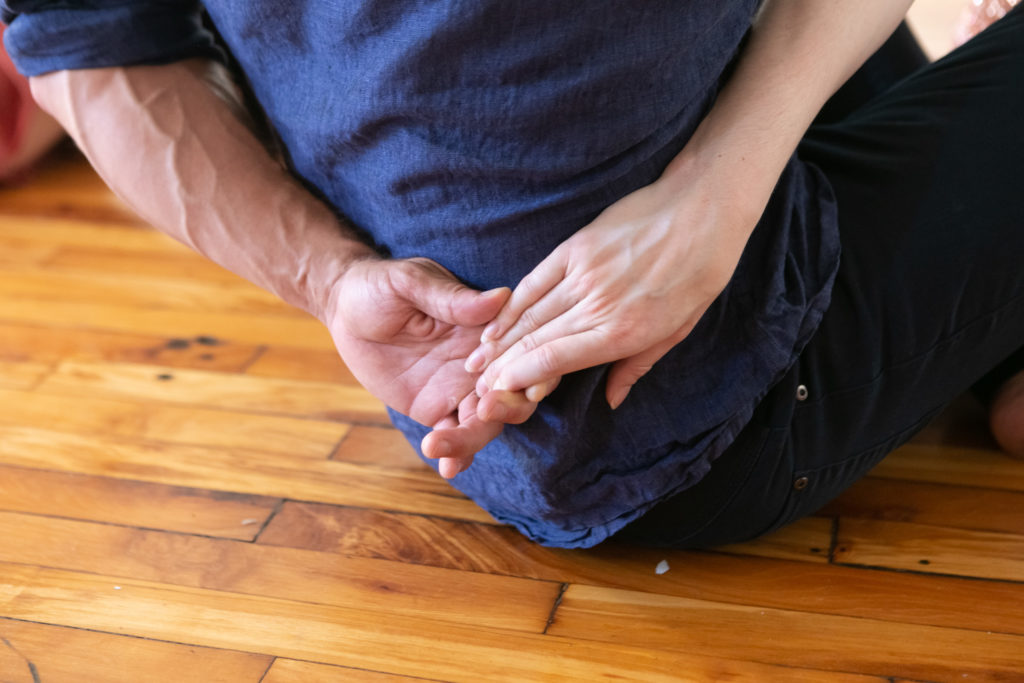
Peter & Lila’s hands. Image by Valerie Zimmer Photography.
[31:26]
Lila: I was really excited that we were going to — quite quickly have something that was ours. That he wouldn’t have experienced with his wife. […] That he wouldn’t have experienced with another girlfriend. Something that would be always remembered, as being ours.
Bevin: Especially because you wanted him to take your virginity, so in many ways this is like a rewind of that, that desire of yours. And then it’s like, shoe’s on another foot.
[32:03] Lila & Peter did the Boundaries / Fears / Intentions / Desires exercise.
[35:57]
Lila: You know how some couples, you see them, and it’s like, their energy is just (Lila makes a creepy comic book villain soul-sucking sound) over the other one, and you feel like their, love, kind of, is only for them. And they’re not sharing it. And I felt, that we were connected, but it felt very much, almost as though, we were — and we weren’t — but almost as though we were holding hands side by side, and so we were connected, we were— even if we were in a different part of the room, we were, we were with each other, we were orbiting each other. And mostly we were together and talking to people together and it felt… like… a blanket? Like a really sweet blanket thrown over both of our shoulders— didn’t exclude anybody else, you know? (Bevin mmhms) And that felt great because that’s the kind of couple that I want to be. Is, a couple that other people feel good to be around, that they feel more loved because of our love, not less loved.
Bevin: Toootally.
Lila: And so I was, even more, excited, (Bevin mmhms) about this prospect. Us being together.
Bevin: Sometimes, when you’re in the middle of this like, kind of epic love story, it’s like, all the Hallmark Christmas movies. (Lila giggles)
[35:26] What happened at the play party…
[37:07] Lila asks Peter for something.
[39:51] Then Lila goes to Burning Man / and has a Wednesday night meltdown. Read the meltdown story here.

Lila & the Burning Man Temple. Image by Julian Milo. August 2018
[40:47] Bevin on managing one’s emotional attachment to a lover.
[43:41] Bevin on pattern recognition and self-work.
Bevin: So much of my music tastes— like, I love Sleater Kinney because of my first girlfriend teaching me about Sleater Kinney. All of these things happen, right, because of what we’re drawn to. So like, attracted to people, attracted to things, paying attention to where our desire is shifting us, but then also, paying attention to the patterns in that attraction too, like if you’re constantly— I dated four people in a row who ghosted me, and this was before ghosting was even a popular term, but, four people in a row, and they all broke up with me by not talking to me anymore, and I was like, That’s real fucked-up, but I am the common denominator, which inspired me to do a lot of self-work and dig into […] why I was being drawn to that, and choosing to focus my attention on the people who were focusing their attention on me, helped to open me up to just making choices that were better for my heart overall. But like trusting your attraction to teach you something, at least.
[44:47] Biscuit Reynolds joins in. And sneezes on Lila (again).
[45:12] Lila continues the story, post- Burning Man. Realizing that she was pregnant.
[50:55] Lila on why she chose a surgical abortion vs. medical abortion.
surgical abortion (noun) = a termination of pregnancy that involves removing the contents of the uterus by surgical means, most commonly through suction.
medical abortion (noun) = a non-surgical termination of pregnancy, which induces the uterus to dispel its contents, through medicine, typically a regimen of two pills taken separately.
Lila: I thought that it would be… that I’d be taken care of, at Planned Parenthood, which I was. (Bevin mmhms) That it would be quicker and, I would have much less pain.
Bevin: Did you think that was the case in the outset? Like—
Lila: Yes.
Bevin: Yeah, okay.
Planned Parenthood (noun) = a web of clinics in the United States that provide free / low cost birth control, abortion access, STI tests, and reproductive care. Utilized by many underserved populations, and legions of people without health insurance.
Lila: Definitely. I’m very very very sensitive to any kinds of— anything. I’m sensitive to everything, I’m an— I think I’m an HSP, which is a actual term, a Highly Sensitive Person.
HSP aka Highly Sensitive Person (noun) = one who is extraordinarily responsive to all kinds of stimuli, highly emotionally reactive, deeply empathetic, and hyper-aware of their surroundings.
And, so, any kind of medicine, any kind of anything I’m just, I’m super-sensitive. And I, I imagine the kind of experience I would have had, taking pills. To, to do that would, would have been really unsettling, plus I was able to choose full anesthesia.
Bevin: Oh!
Lila: So I was asleep.
Bevin: Oh great.
Lila: Which is what I wanted.
Bevin: Oh what an option; I didn’t even know you could have that option. I thought it was more like going to the dentist.
Lila: I was told by somebody who went to Planned Parenthood maybe 10 years ago, that you couldn’t. That you could only have localized anesthesia. And then I, I asked about it and they said, “Oh no, you can, you can be— you can have the full anesthesia,” and I was like, “Thank you very much; yes please.”
[52:05] Lila on deciding when to tell the father / finding out who the father was.
[54:14] Lila consulted with Pamela Samuelson, sexological bodyworker, bodycare witch, sex educator, the night before her abortion. You can listen to Pamela’s episodes (which were recorded in L.A. one year prior, in Nov. 2017) 50. your pussy is not a sheath, and 51. take back the speculum.
[57:15] Lila on the process of the abortion at Planned Parenthood.
[59:50] Lila on texting 9 people to tell them about the abortion and ask for help… and then receiving it.
[1:05:42]
Lila: I found myself — though I have a very stauch pro-choice ideology — and I do not want children; I’ve never wanted children, it may change, who knows, but I’m 36, and I’ve never felt the desire to have children before— even though I did have that moment, and I told him on the phone, where I, I said, I did have a moment of wondering what it would look like, and he said, “There’s an app for that.” (both cackle) And I laughed, and he made me laugh, you know, in that, in that state. […]
[1:06:28] How long it’s been since Lila and Peter spoke?
[1:07:18] Octopus monogamy.

In the changing room. October 2018
[1:08:09]
Lila: I wound up having though, a lot of, the emotional reactions that people who do want children, but need to have an abortion for another reason— they’re not ready, they don’t have the finances to take care of a child, they had a baby out of wedlock in a society that doesn’t allow that,
Bevin: They were raped.
Lila: They were raped.
Bevin: Yeahp.
Lila: I had a lot of the emotions that I’ve heard people speak about in those situations. And what I determined was: my brain is not in mourning, but my body is. And so my body, is very powerful, and will affect my emotions. And my body, that has such a design that it can procreate, and, my body, that wants to further its genetic code, my body has been robbed of that— opportunity now, and my body is in mourning.
Bevin: Mm.
Lila: And so I was very very very moody. Afterwards, lots of fluctuations of mood.
[1:09:30] Why didn’t Peter show up for Lila’s abortion?
[1:10:25] Bevin on emotional fluctuation & hormones.
Bevin: Our hormones change how we feel so drastically! […] With my friends who have transitioned, especially from like, female to male, the shift in having those hormones in your body— it just really does change your emotional experience and, pregnancy is a hormone game. […] Your hormone changes, like, no wonder you’re moody; your body’s like, Oh, I’m doing this thing—
Lila: Oh, no I’m not! Bevin: Suddenly I’m not!
Bevin: These hormones aren’t being produced anymore; this isn’t happening anym— oh, what, what?! So it does take a lot— a, a while to regulate. So I think there’s like, mourning, but also it’s just change.
[1:11:26] Bevin teaches Lila a new acronym.
Bevin: I’m curious about the conversation with Peter, absent a commitment. Like, deci— ‘cause you guys hadn’t even had like, a real DTR, it sounds like.
Lila: What was that?
Bevin: A DTR: Define The Relationship.
DTR (acronym) = standing for Define The Relationship, DTR refers to a conversation between the people involved in a romantic / sexual relationship which has the outcome of either choosing a label for the relationship (“primary partners” or “friends with benefits,” for example) or defining the parameters of the relationship (“We won’t fuck anybody else in our city, but we’ll give each other a hall pass while traveling.”)
hall pass (noun) = just like a hall pass in high school, which allows a student to be “out of bounds” (in the hall, in the bathroom) while they are supposed to be in class, the term refers to permission granted by a partner — with whom one typically has a monogamous relationship — to knowingly allow another partner to have a sexual encounter outside of the relationship, in very specific instances, such as when traveling, or with a long-fantasized-about celebrity.
[1:11:46] Why did Lila choose to become fluid-bonded with Peter? How did the conversation go?
[1:12:19] Lila & the safer sex talk.
Lila: It’s all about risk, risk level, and risk-tolerance, right, because there is no safe sex, there is only safer sex—
Bevin: Yeah.
Lila: So, the conversation was— he was fluid-bonded with his wife; he was tested afterwards. Since then, he’d had two sexual partners and they’d used condoms. I was comfortable with that level of risk. (Bevin uhhuhs) I had… been in a monogamous relationship — fluid-bonded as well — and we were tested before that. Since then, I had had sex with a handful of people, with protection, and one person without protection. He was, of known status with his, partners, and he had been tested with his partners. I was comfortable with that level of risk. And, Peter was, as well. (Bevin mmhms) So that’s the conversation that we had, was like— ‘cause we were already basically, like, playing around and, and skirting the— I think it’s the introitus—
[Note: It is]
introitus (noun) = the technical term for the entrance to the vaginal canal.
Lila: The entrance, to my vagina […] and usually, I just say, “Want to have our safer sex talk now?” (Bevin laughs) And it’s been astonishing to me—
Bevin: That’s a good way to enter that conversation, but it’s also totally possible to have that conversation and use that line, before anybody’s even partially naked.
Lila: (big intake of breath) Sure!
Bevin: I mean, you could.
Lila: Absolutely. I’m n— I just—
Bevin: I’m not dressing you down; I’m just—
Lila: I just haven’t done it.
Bevin: — offering a possibility for the listeners.
Lila: I just haven’t done it. Also because, it seems a little presumptive sometimes.
Bevin: That conversation can be foreplay.
Lila: Could be.
Bevin: Especially when you’re talking desire, and you’re talking about negotiation, like, having that conversation, “Oh, what’s your risk level?” yaddayaddayadda. (Lila mmhms) But I’m always like, curious like, how people make decisions around fluid-bonding and risk levels, and all of that stuff.
Lila: And there was a little bit of transgression, it was like, Nmm, we probably shouldn’t! But it feels so good!
Bevin: Does it feel better without a condom?
[14:29] Bevin on queer sex.
Bevin: It’s so interesting ‘cause I don’t have procreative sex— even when you were talking about, like, coming at the same time, like that’s, a rare occurrence in my sex lives, it’s always like, pretty much “your turn, my turn” queer sex. (Lila mmhms) And it’s funny, ‘cause I’ve had one sexual experience with a person who has a penis, and like, we didn’t have penis-in-vagina sex, but later when we were talking about it, I was like, “What we did was sex.” I was like, “That was just queer sex.”
Lila: Yeah.
Bevin: Because we’re not centering a penis.
Lila: Yeah!
Bevin: It doesn’t like, mean that that wasn’t sex, and it blew his mind.
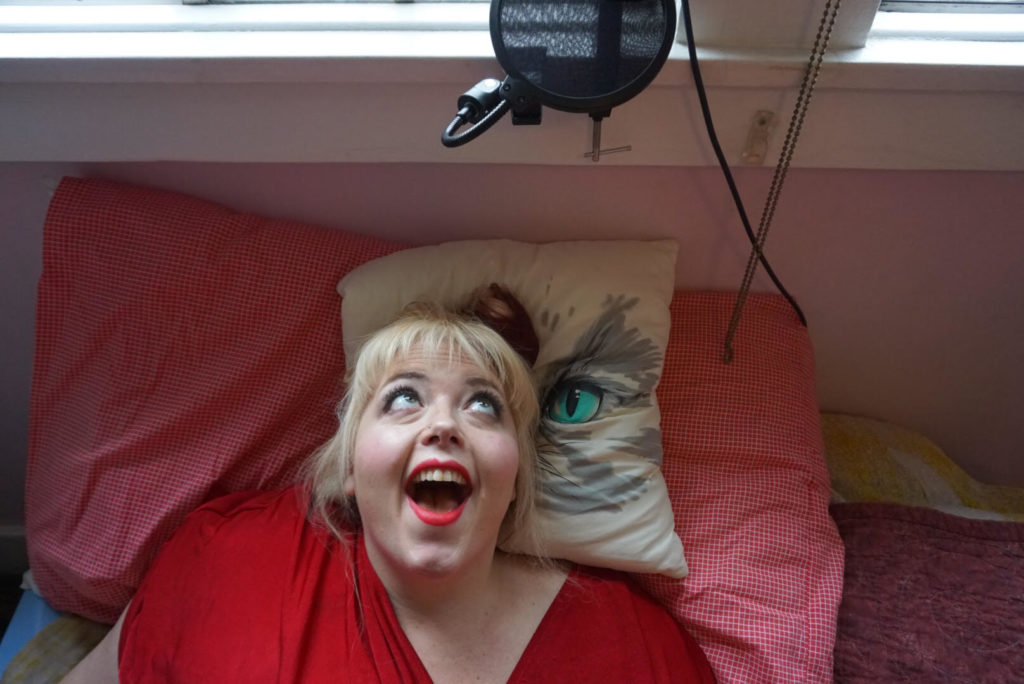
Bevin, horizontal in her guest room, beneath my microphone. Los Angeles, California. December 2018
[1:15:10] Why Bevin uses condoms.
Bevin: I love a condom! Easy cleanup for sex toys! […] (laughs) I’m like the lesbian at the LGBT center, grabbing condoms because I don’t wanna clean my dildo!
[1:15:28] Lila on her journey with penetrative sex.
[1:16:10] Bevin asks Lila if she’ll change her behavior.
Bevin: Do you think that like — just to ask, and you can also feel free not to answer, but — I’m curious if you feel like, your experience having had an abortion is going— and also the pleasure experience, right, ‘cause we’re these like, creatures that are in search of pleasure, and your pleasure experience that’s heightened without the use of condoms, will that— and also, your heightened sensitivity to medication (Lila mmhms) how does that all play out now in terms of your desire to maybe get on birth control or maybe, do something else?
[1:18:26]
Lila: Here’s how I want to change my behavior: I want to — if I’m going to be fluid-bonded — start practicing the fertility awareness method, which is 99+ percent effective when you do it correctly. Which is taking your vaginal temperature, checking your secretions, and, you know, calendering. […]
[Note: this is not a precise statistic, but the efficacy is very, very high.]
Bevin: How do you learn about that? […]
Lila: Pamela Samuelson knows a ton about the fertility awareness method, yeah. And there’s also an app that she recommends. […]
[Note: The app is called Kindara: The Fertility Awareness App.]
Bevin: Who in many ways, by the way, was your abortion doula. You had, probably a world-renowned expert as an abortion doula available to you, which makes your experience… probably— great, compared to some others.
Lila: That’s a really really good call. […] I didn’t even know that there was such a thing as an abortion doula until she, she told me that day, “Oh, this person that I connected you with that I said you should meet up with— she’s an abortion doula.” I didn’t reach out to her, […] But I did reach out to Pamela, so that’s a very good point. So I do want people to know that there are abortion doulas. […] People who help guide you through the experience and, and through the after-experience, and to prepare and, and to download about it. And that’s, that’s pretty incredible.
abortion doula (noun) = a person who provides empathy, counsel, wisdom, emotional support, and sometimes physical presence during the process and shortly afterwards, to someone undergoing an abortion procedure. Unlike a birth doula, an abortion doula is typically a volunteer.
[Note: Here’s an article about being an abortion doula, “I’m an Abortion Doula: Here’s What I Do and See During a Typical Shift” and the website for The Doula Project, which provides support to pregnant people regardless of the outcome of the pregnancy, free of charge, to remove the economic burden from the pregnant person.]
doula, or, birth doula = a person who provides empathy, counsel, wisdom, anatomical expertise, emotional support, and physical presence during the birth process and shortly afterwards.
[1:20:02] Doulas!
Bevin: Doulas are so amazing, ‘cause doulas like, exist for birth. They exist for abortions. They exist for death. And—
Lila: Hmm I didn’t know that.
Bevin: Yeah, and they, they’re there to have the knowledge and— ‘cause we used to give birth on bricks. And, we used to give birth amongst the company of women. And like, we don’t have that system or society anymore, and that, I think is to our loss, and doulas are like, this connection we have to that, like Women’s Bodies, Women’s Wisdom experience of like, the legacy of passing down and like, who knew about herbs because they were tol— taught about herbs, and before we had record-keeping, we had, women passing down stories to other women, and people passing down stories to other people, and like, doulas are there to be prepared with all of the emotional and physical knowledge, to help you be prepared and transition through a difficult emotional experience.
Lila: I realized when I started telling people — because transparency is important to me, and I am willing to tell and to share, that so many people had had this experience of having an abortion, that I was completely unaware of because they don’t talk about it. And people told me that their friends had abortions and wouldn’t talk to them about it. And they had all these questions; they were curious, and, then, I was also told by some people, that they didn’t have anybody to talk to about it, (Bevin mm’s sympathetically) anybody that they felt they could talk to about it, or anybody that would understand. So I want to be talking about it and I started telling people. I told people at a, birthday party […] and they were really curious; they wanted to know about it. And the thing is people are curious, and because most people don’t talk about it, people don’t know. I want people to know; I don’t want it to be something that’s so taboo to talk about, since so many of us have had it and mo— many, not most — many of us believe in the right to have it, so, we wanna know… wanna know about it.
[1:22:23] Lila on Poppy Liu and #shoutyourabortion
Lila: I know someone named Poppy Liu, and she made — I think it was a performance tour, and also a film — called, My Abortion Story,
[Note: The film is actually called, Names of Women.]
and, did a hashtag #shoutyourabortion — I was telling somebody about this story the other night, and he said— it was Wry, who’s actually been on the podcast — “Yeah, well there hasn’t been that hashtag yet.” And I said, “There actually has,” but it hasn’t, it hasn’t had that kind of wide-spreadness of #metoo or #yesallwomen or something, but—
Bevin: I mean, let’s point out that #metoo started many years ago and—
Lila: And didn’t resurge until, until recently. For sure. So: #shoutyourabortion.
Bevin: #shoutyourabortion could still take off!
Lila: And I just read… her abortion story in a ‘zine, and it’s really quite incredible, and she speaks about how the intersectionality of it was so, so curious and so challenging for her, being an Asian queer femme. And I love that she’s vocal; I love that she’s so vocal about it, and has created a platform for other people to be vocal about it.
[1:24:21] After Lila tells Bevin that she convinces herself not to call Peter, every day.
Bevin: Why are you resisting calling him, like what’s?
Lila: Because he’s not moving towards me.
Bevin: Oghh. You know that’s hard. That’s a tangle. I, I wonder. So when Dara and I got back together— before we got back together we like— she had left town. She broke up with me to become a single nomad. She had left town and, she was like, not proving to be a particularly great friend, and so I was like, “You’re not being a great friend to me, so I don’t really want you around.” I have plenty of friends; I have great friends. So, in terms of like, going towards the people who are not going towards you, I had made a decision that, I didn’t want to be friends with her, but then when she came back to town, there was the realization that I made, in the wake of this breakup— like, mind you, at this point we’d broken u— been broken up four or five months, and I was still like— she’s still like, there, in my presence, like, in my brain, like, taking up space, and like, I was like, I really wish that we could just like, have sex and not talk. Like, if we could just— (Lila laughs throatily) if you could just show up, we could fuck, and then not talk at all. That would be ideal.
Lila: That’s something you could negotiate!
Bevin: Exactly. So then when she came back to town, the only reason I agreed to see her — she was in town for a conference — was because we both RSVP’d to the same sex party (Lila laughs) and it was just like, it’s Queer Invasion, which is a sex party that happens in Connecticut — it’s quarterly, so it’s like an event, and my friends, I’d never been. My friends and I were so excited to take the road trip to Connecticut together to it, and then, I found out she was gonna be there, so then, I was like, so then I did agree to see her, because I didn’t want to see her for the first time at a sex party.
Lila: Oh no, yeah.
Bevin: So I agreed to see her. She wanted it to be in public and I was like, “Absolutely not,” because I didn’t want to cry in a restaurant.
Lila: Totally!
Bevin: (laughing) And so, I was like, “No, you can come to my house; we will have tea, and this is how it will be.” And so she showed up and like, basically, we ended up spending so long negotiating having sex, and I just told her, I was like, “I can’t be friends with you, but I can have sex with you. So we can be benefits, and not friends.” And so then—
Lila: (guffaws) We can be benefits!
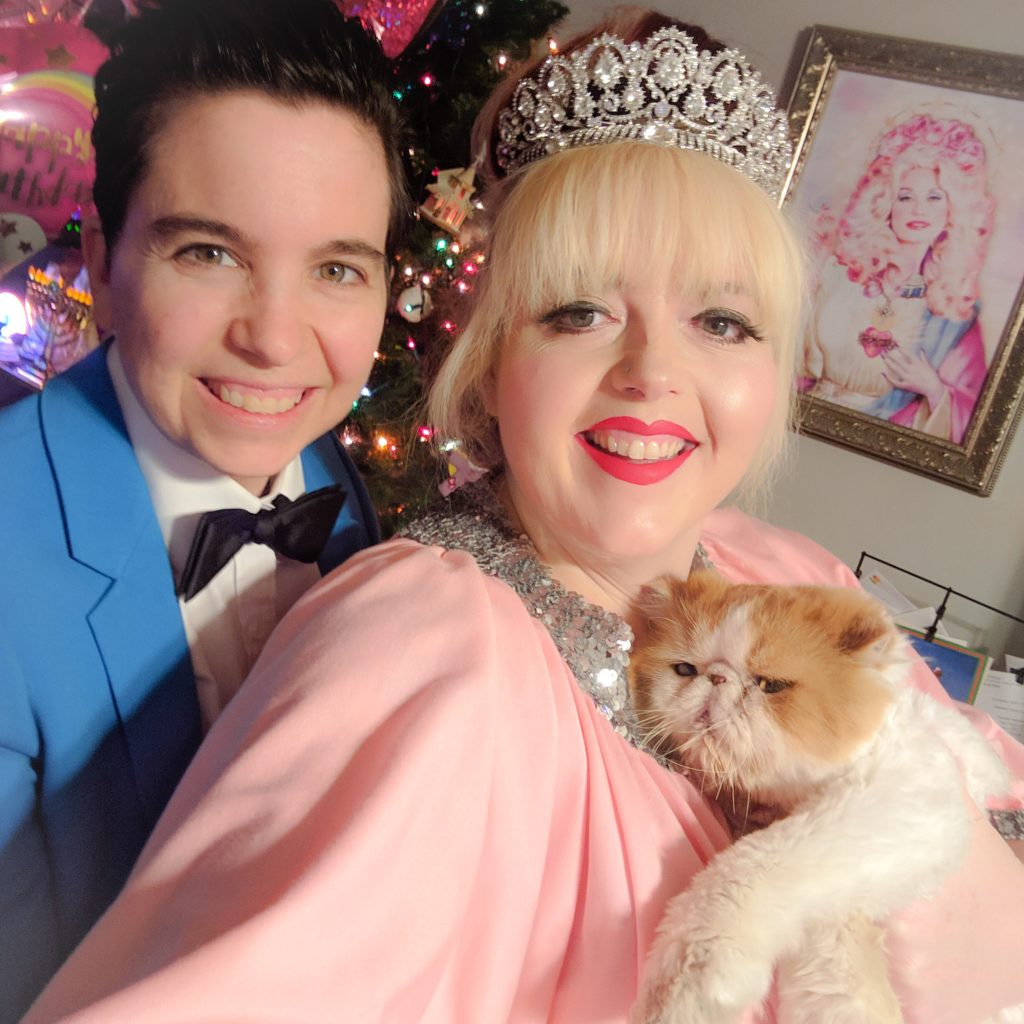
They’re engaged now. Dara & Bevin (plus Biscuit), NYE 2019
Bevin: And that’s what we did! And like, we had like, a hot, um, couple of encounters, we saw each other at that sex party and ended up having sex at the hotel — because I have better sex outside of a public space. (Lila mmhms) And we had really hot hotel sex, and then, that was it, and then she, um, left town, went back to L.A., and then, I kept wanting to call her. And I kept wanting to call her, and it wouldn’t go away. And like, I just kept calling my friends, and I kept doing all the things that I normally do to like, not do the thing, and then, she ended up calling me, like, or sending me a text message saying: Can I talk to you tonight? It’s important. A la: how you communicated with Peter, (Lila mmhms) and I was like, Okay, you can call me tonight. Here’s, a good time. And, she called me to tell me that she’d been diagnosed with breast cancer. (Lila exhales with a whoosh) So like, all that time I wanted to call her, was like, I think, my intuition being like, You need to connect with her. You need to connect with her. And like, she came back to New York, to… get treatment, and so then she came back and like, when we saw each other again, it was like, the entrance of a life-threatening situation really helped us drop the bullshit, and like, all the things that I had— that had really stressed me out about her, before, like, she didn’t make me a priority I was always her last priority — (Lila mm’s empathetically) she was always getting up to go have breakfast with someone else, right, like— (Lila mm’s empathetically again) it was always that like, running running running, and then, she shifted. Her priorities shifted. Her priority became staying alive, and relationships. And all the ways that she was frustrated with me in our first iteration had to do with me feeling insecure about her. And like, once I was secure, once I felt more calm and comfortable around her, and I was able to like, gauge things slowly, I was just calmer and easier to be around. […] So I’m curious about you resisting the desire to call and maybe, giving it a possibility of like (Lila mewls) that connection and what’s— what intimacy is still possible, even after this experience.
To listen to this exclusive episode, become a patron of the horizontal arts at $5+! And I shall happydance!


